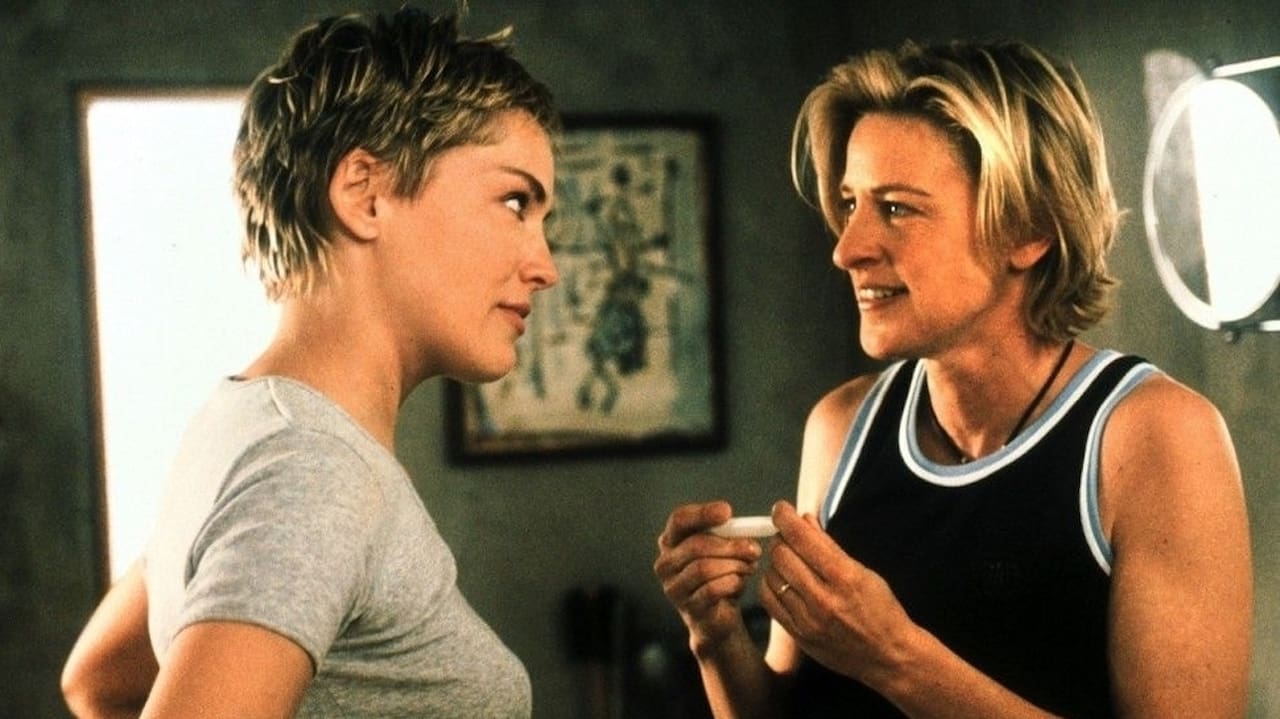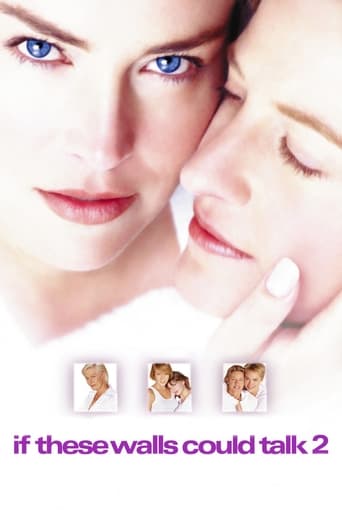

I saw this film on the recommendation of a friend. In fact her recommendation was so good, I got the film from Amazon before I'd even seen it and as usual she was so right! The first part is moving, brilliantly acted and very, very sad. You will need tissues for this one. It may also anger you, as it did me! The treatment the old lady receives from the nephew is just appalling.The second part is less sad. I was still moved by it and sad at times but overall it's very good. The sex scenes throughout this movie are very tasteful in my opinion. Very watchable.The third and final part is my favourite. Ellen is such a funny and amazing actress and Sharon Stone is excellent, also. The topic discussed here is very moving, but very well dealt with. The sex scenes are sexy and yet tasteful. They are in no way pornographic as I have heard people say. The story is one that many lesbians can relate to, or maybe will relate to in the future (my self included, hopefully) and the ending makes me cry every time! My only negative point is that it wasn't longer! A full movie about this topic with these characters would be a must-see in my opinion! Perhaps someone should write one?I think the film would be enjoyable to anyone, not just lesbians and it is well worth a look. Enjoy Charlene
... View MoreITWCT2 is a simple portmanteau film based on the experience of lesbianism. However, the linking device is the overstretched external coincidence of a house that we are expected to accept has attracted lesbian residents, not for merely two, but for three successive generations!! As an entirety, therefore, 'The Hours' must be recognised as the better film, overall, since the psychological coincidence of each of three female protagonists having read Virginia Woolf's 'Mrs. Dalloway' is obviously located in cultural, rather than material, space, as well as being naturally sustainable as an influence over time and a wide range of personal backgrounds. The structure of 'The Hours' is far more sophisticated, and acceptable, as a linking device.Nevertheless, I believe that the obviously fractured - and artistically uneven - divisions of ITWCT2 do contain one story, the first in sequence, that stands out at every artistic and emotional level from the others, that were hatched in the same nest. Not only so, but the story of poor Miss Tree, and her almost childlike companion who somehow perches, like a little unfledged bird, precariously above the abyss which is the world, has a power and depth far beyond anything even attempted in Minghella's generally somewhat aridly stylish and intellectual exercise. Not even his middle, and best, episode, concerning the repressed 1950's housewife, has anything to show more devastating than Miss Tree's utter and complete bereavement in Redgrave's superb performance.The final shot of a jackdaw about to depart through the window, opened to air the now completely empty house prior to the arrival of new, unknown, residents, is alone worth everything in the bigger film.I will confess that the overall 'agenda' of ITWCT2 is of little intrinsic interest to this old-fashioned male, and nor did the other two segments possess the artistic power and truth to involve me greatly. Nor do Vanessa Redgrave's personal beliefs and political creed have any appeal for one who counts himself a natural conservative.Yet, despite this, Miss Redgrave's performance shines forth for its human integrity and power, completely untainted by any political gesturing whatsoever. How could anyone fail to love Miss Tree, as brought to life by Vanessa Redgrave's deep understanding of the wellsprings of human nature?The portrait, which she sustains so believably, of the cruel ending of a tender relationship, which had flourished gently and unseen - like a delicate bloom, overgrown and hidden away from the busy thoroughfares of the heedless world - ever since the innocence of an Edwardian childhood, is heartbreaking. In many ways, it is the general insensitive hard-heartedness of the modern age which is responsible for the suffering of an innocent person, in this drama. For I believe that the educated classes of previous ages would have been more likely to respond with at least a modicum of decent tact when confronted by the predicament of any such 'delicate situation.' Only the little daughter of the deceased companion's nephew glimpses at least a glimmer of the sympathy and respect that should be given to such heartfelt grief. The moment of departure for the deceased aunt's relatives presents the stark contrast of the chilly wife's ruthless censorship of all Miss Tree's humanity, with the handshake - as of equals! - between the old woman and the young girl who was, in the end, naturally and simply sorry for her, and it is a moment of all-too-brief communication across the generations.Perhaps it was the gentleness and simplicity of another era, another culture, that alone could permit the basic tolerance of 'don't ask - don't tell' (at least insofar as women were concerned), which Miss Tree's relationship seemed so much to depend upon? Possibly this demonstrates the felt necessity of contemporary political militancy in defence of such choices, with all the attendant crudity and emotional alienation which now so disfigure what is - and after all should ideally remain - a private affair.Certainly, there is a beauty and sweetness to the twilight of this lifelong inter-dependence, which to see disposed of so casually - whether in the form of the poor corpse in the hospital, or those of the beloved presents of little model birds that are all simply expropriated as material items - is to see exposed in all its obscenity the profoundly unspiritual ugliness of the modern world. See this short film as a self-contained drama, and know that you have witnessed true greatness. And a beauty that is never mawkish. This brief tragedy resonates with our own society's guilt for having trampled over the delicate structure of the heart, where love and dreams and happiness are nursed for flight. Can any mere political movements put those crushed chicks back into their palpitating eggs?What this strong, yet simple, piece of work shows is how casually the world can brush aside all that may be of the greatest importance to an individual. The inescapable loneliness of human beings has seldom been more powerfully evoked. And only the big heart of Vanessa Redgrave could ever have sustained such a sublime portrait of grief.
... View MoreVanessa Redgrave moved me to no end in the first segment. a great story for people to go back and reflect on as the battle lines are being drawn on the issue of gay marriage. But the second two segments have not held up as well upon repeated viewings. I often just watch the first segment and then change the channel. The other two are not horrible, but the first ITWCT was stonger across the board.
... View MoreThree slightly self-indulgent stories with a lesbian theme. The problem here is that lesbianism is not just a theme of these stories, it is the theme, and a single (and predictable) prevailing attitude provides each drama with both premise and conclusions. It is not that this attitude is wrong, rather that it robs the dramas of the qualities of breath and moral ambiguity that mark all truly powerful stories. Vanessa Redgrave is excellent in the first part, which thereby moves you although you never feel there is never any scope for anything other than the eventual ending; the other two tales pass without interest. Truly good film makes the viewer feel a little more uneasy and a little less certain about themselves; but the overall tone here is one of celebration, and its a weaker work for that.
... View More